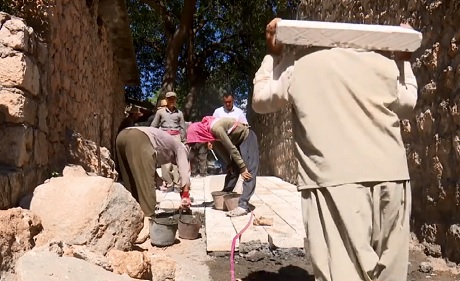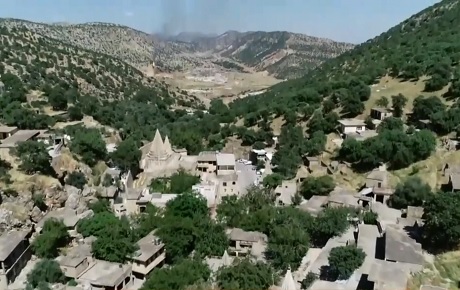ERBIL, Kurdistan Region – Restoration work has resumed on the holy Yezidi temple of Lalish in Duhok province thanks to dozens of volunteers. Work began at the site late last year.
The master-plan for the restoration was prepared by the Kurdistan Regional Government (KRG) in 2012. However, work was suspended in 2014 with the outbreak of war with the Islamic State group (ISIS) and the onset of the financial crisis.
Yezidi philanthropists stepped in and raised $15 million to cover the cost while a team of dedicated volunteers set to work.
Project supervisors say they want to use locally sourced natural materials so the ancient site doesn’t lose its original shape and look.
“No time-frame has been laid for the repairs to finish,” Khalid Narmo, an engineer working at the site, told Rudaw.
“We would like to use to the old natural substances for the restoration, like those initially used a century and a millennium ago,” he said.
Shahin Hannan, a Yezidi who was displaced from Afrin, northwest Syria by Turkey’s Operation Olive Branch last year, says he is ready to volunteer to “serve” Lalish.
“We are becoming Lalish’s servant. We dreamed of seeing Lalish when we were in Afrin. We are happy to be here now to serve our Lalish,” he said.
Yezidis usually gather here with their spiritual leaders for their most important rituals. Followers are expected to make at least one pilgrimage to Lalish in their lifetime.
Visitors are expected to remove their shoes before entering the village as a sign of respect.
The Yezidi faith is among the world’s oldest religions. The exact date that Lalish was established is unknown. Historians and archaeologists believe the site could be at least 4,000 years old and a part of Sumer and other ancient civilizations.
Lalish was thankfully spared the ravages of the ISIS genocide against the Yezidis in 2014, which saw the community’s homeland of Shingal brutally pillaged.
Most of the structural damage in Lalish is due to its age and a lack of maintenance.
With reporting by Naif Ramazan
The master-plan for the restoration was prepared by the Kurdistan Regional Government (KRG) in 2012. However, work was suspended in 2014 with the outbreak of war with the Islamic State group (ISIS) and the onset of the financial crisis.
Yezidi philanthropists stepped in and raised $15 million to cover the cost while a team of dedicated volunteers set to work.
Project supervisors say they want to use locally sourced natural materials so the ancient site doesn’t lose its original shape and look.
“No time-frame has been laid for the repairs to finish,” Khalid Narmo, an engineer working at the site, told Rudaw.
“We would like to use to the old natural substances for the restoration, like those initially used a century and a millennium ago,” he said.
Volunteers repave a Lalish street with materials used at the site for thousands of years. Photo: Rudaw TV
Shahin Hannan, a Yezidi who was displaced from Afrin, northwest Syria by Turkey’s Operation Olive Branch last year, says he is ready to volunteer to “serve” Lalish.
“We are becoming Lalish’s servant. We dreamed of seeing Lalish when we were in Afrin. We are happy to be here now to serve our Lalish,” he said.
The holy site is tucked away in a secluded valley 9 kilometers from the town of Sheikhan and 40 kilometers east of Duhok city.
Yezidis usually gather here with their spiritual leaders for their most important rituals. Followers are expected to make at least one pilgrimage to Lalish in their lifetime.
Visitors are expected to remove their shoes before entering the village as a sign of respect.
An aerial view of Lalish and its iconic spires. Photo: Rudaw TV
The Yezidi faith is among the world’s oldest religions. The exact date that Lalish was established is unknown. Historians and archaeologists believe the site could be at least 4,000 years old and a part of Sumer and other ancient civilizations.
Lalish was thankfully spared the ravages of the ISIS genocide against the Yezidis in 2014, which saw the community’s homeland of Shingal brutally pillaged.
Most of the structural damage in Lalish is due to its age and a lack of maintenance.
With reporting by Naif Ramazan





Comments
Rudaw moderates all comments submitted on our website. We welcome comments which are relevant to the article and encourage further discussion about the issues that matter to you. We also welcome constructive criticism about Rudaw.
To be approved for publication, however, your comments must meet our community guidelines.
We will not tolerate the following: profanity, threats, personal attacks, vulgarity, abuse (such as sexism, racism, homophobia or xenophobia), or commercial or personal promotion.
Comments that do not meet our guidelines will be rejected. Comments are not edited – they are either approved or rejected.
Post a comment